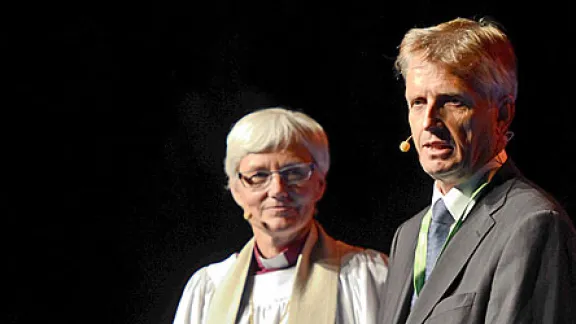
Rev. Martin Junge and Bishop Dr Antje Jackelén at Världens Fest. © Magnus Aronson/IKON
Junge Addresses Church of Sweden’s Världen Fest
The Lutheran World Federation (LWF) general secretary Rev. Martin Junge has urged the Church of Sweden to view Sweden’s growing secularization and cultural diversity as opportunities to redefine the church.
“All these challenges and changes shouldn’t be obstacles for a renewed and sustained reflection and discernment about this church’s call into God’s mission but an opportunity to define how the church claims its citizenship anew, and how it defines its presence in the public space,” Junge said.
The LWF general secretary addressed Världens Fest 2012, which was held 7-9 September in Malmö to highlight the Church of Sweden’s international mission. It featured lectures, seminars, public events and cultural programs.
Världens Fest annually draws 3,500 participants and10,000 visitors to the public events in the diverse city of Malmö. This year the focus was on sustainable development, the Church worldwide and human rights.
In his address, titled “Owning Citizenship – the church in the public space,” Junge noted that just as Martin Luther’s theological reflections erupted into the public space, Lutheran churches today must act as citizens of the world.
“This citizenship is configured by the very fundamental question at the core of every church: what does God want this church to be? What does God want the church to be here in Sweden? How does it continue participating in God’s deep compassion for human beings and God’s zeal for justice?” Junge asked.
Junge maintained that the Church has a distinct role to play in the public space that is rooted in the witness and voice of its faith in God.
“No church should shy away from that identity, but should instead offer it with joy and humility for the shared public space, where indeed other voices with different insights and perspectives will also be heard,” he added.
In the midst of a worldwide financial crisis and the threat of climate change, Junge argued that there is a pressing need for global citizenship and an ethical framework that informs decision making on justice issues.
“Churches need to be part of that conversation. Churches owe their own, distinct contribution into that conversation. It is a conversation that transcends largely the realm of the economy, and touches on the very question of how the human family intends and agrees to live together in this one world that we all share,” Junge said.
Lutheran theology assists this conversation by underscoring the idea that freedom comes with responsibilities. However, Junge emphasized that churches must listen humbly to other voices in the conversation.
“The relevance of their message is tested in the church’s ability to listen, to see, to touch, to accompany, and to discern … and then to offer its own insights out of the rich and deep treasures of faith.
“It is love for the neighbor that ushers theological insights and treasures into the public, sometimes even by gently kissing these insights and treasures to awake from peaceful, sometimes even complacent sleep,” Junge concluded.


